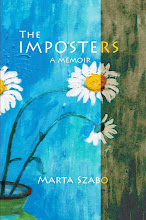I mailed a card to my father this morning. I sat down yesterday evening, found a card in the stack on the bookshelf that was adequate quality to send him, a card not perfectly suited for him, a card that would have been perfect for my mother, a colorful wood block print of birds – the artwork not fine and classic the way my father would expect, but the shades ob blue and gray were strong and striking and I could imagine him noticing that.
I wrote a card that said very little. It talked about how Spring was coming, how we and the workshops were doing well. I didn’t mention
The sadness in my father is huge. When I was little I remember noticing how all the Hungarians who came to our house were sad. My father laughed when I told him what I saw – I was only three or four – and he always remembered and repeated it. But my father’s sadness went far beyond the sadness I saw in the guests, his friends.
But he was never glum He was always being the cheerful one. When I was little I loved the way he made everything better. And when I got older and became a teenager I hated what felt now like false cheer and like pressure to hold up my end of the bargain.
I stopped speaking to him. Not out of meanness or on purpose, but at some point I froze up against him and when he took me out to the opera or a concert or for an extravagant dinner – driving into the city from the suburbs -- something I looked forward to – my voice dried up, and he would talk and keep talking, telling stories from his Hungarian youth, or discussing some piece of history he was reading about. I froze, and I didn’t know what it was that had me glaring out the window. Later when I met him on Wednesday nights at the Yale Club for dinner when I was going to school and living in a city dorm – I didn’t know what it was that curdled our evening every week and made me want to get away.
I thought it was something more in me than in him, and I wished I could be the daughter I imagined him wanting – intellectual, European, Ingrid Bergman, laughing, entertaining. And all I could manage was to be very pretty and almost completely silent.
I would leave the Yale Club, cross the street into Grand Central and into the subway, with relief to be back on my own ground, to be in motion with everyone else, going from one thing to the next, though I would end at the dead end of my small dorm room where I closed the door and then there’d be nothing, a frozen space – my bookshelf, my records, but everything standing still.
And the only thing that brought real movement into the room was Jeffrey’s call at 11pm when the rates went down. I waited for it, the black phone and phone cord linking me again to a world where there was movement – his voice, his friends, his family.
As I spoke to him I always felt I was faking it, pretending to be someone that might have a role in the world Jeffrey was in. It didn’t matter that he said he loved me. It mattered in that I wanted to hear him say it, but the words provided only the most fleeting sense of safety.
I would take his world, pull it over me like a blanket, like camouflage to hide behind.
And it was all so scary because I knew I could not pull this off forever. This boy, who made all the difference, was sure to leave at any moment.





No comments:
Post a Comment